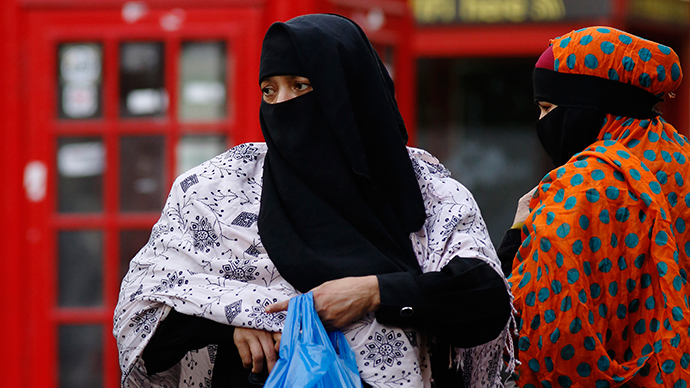#PeopleNOTpolls: Who will British Muslims be voting for in #GE2015?

Against a backdrop of foreign wars, UK support for Israel and repressive Gulf States and the trimming of civil liberties in the name of national security, it is unclear which party best represents the interests of British Muslims.
In April, a noted Muslim human rights campaigner blasted the state of British electoral politics. Cerie Bullivant of the advocacy group Cage said: “My personal belief is you are voting for the wolf that is going to eat you and that is a sad state of affairs.
“I wish it wasn’t like that and there were people who were standing for civil liberty and that they could protect the rights of everybody,” he told the Ilford Recorder.
However, not all British Muslims see the British democratic system as exhausted.
READ MORE: ‘Racist legislation’: British Muslims hit out at new anti-terror laws
Salma, a Muslim ophthalmologist from London, told RT one of the emerging parties, as opposed to the long established Labour and Conservative parties, had drawn her attention.
“In my council I need to look at [the] Green manifesto most.”
She said that foreign policy – specifically recent events around the Israel/Palestine conflict – had highlighted for her the problems with electoral parties at home. She drew attention to the Muslim foreign minister, Baroness Warsi, who resigned over her party’s stance on Gaza.
“Definitely not the Conservatives – Baroness Warsi drew light to how they treat Muslims.”
Salma reiterated a traditional attachment among Muslims to the Labour Party.
“I would say more Muslims would vote Labour, as their MPs have the largest outreach with Muslims.
“They recently launched their new program to combat Islamophobia which looked promising … Also they are committed to making parliament more diverse.”
In recent decades, however, generational loyalty to Labour among the Muslim community has been shaken, particularly amongst the young.
Assed Baig, 34, is a journalist who frequently covers issues affecting the Muslim community in his home city of Birmingham.
He told RT the impact of the Iraq War on Muslims’ perceptions of Labour was “massive,” alienating thousands of potential supporters.
“The elders in the community generally stayed loyal. Meaning the party members. But it also meant loads just didn't vote,” said Baig.
Asked if there was a party capable of catering to the specific needs of British Muslims, Baig pointed to his own working class background.
“Don’t think that is possible. [I] can't see it in those terms,” said Baig.
READ MORE: Culture of fear: Suspicion of Muslims growing, survey suggests
“I think that the majority of Muslims are working class, and it is more of a class issue than [a] religious one. We are seeing middle class Muslims shifting from traditional Labour to other parties.”
“A lot of people I know in inner city Brum [Birmingham] just don't vote. Some whose relatives are standing in elections.
“Basically if you're an inner city Muslim, slugging it out, who appeals to you? No one,” he added.
While he felt no party ticked all the political boxes, there had been individuals who had garnered support.
“If you look at how [then-Respect candidate] Salma Yaqoob in Birmingham came out of nowhere to nearly oust a Labour MP, it shows that she appealed to loads of Muslims and non-Muslims.”
Echoing Bullivant’s view, Baig maintained that the problem is systemic rather than ethnic.
“People I know, of my background, either don't vote or can't be bothered and feel let down by the mainstream parties as they think they are pretty similar. I won't be voting for any of the mainstream parties.”
Share your thoughts with RT with the hashtag #PeopleNOTpolls.












